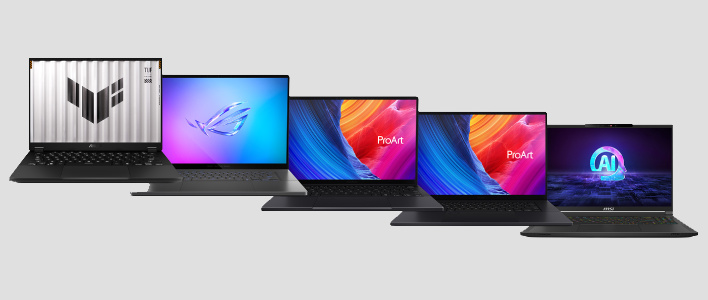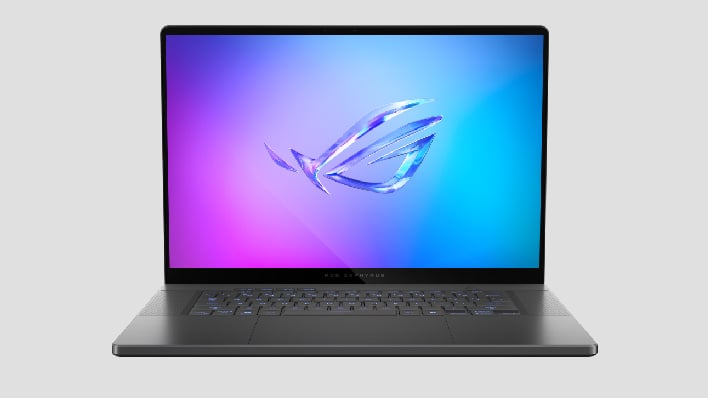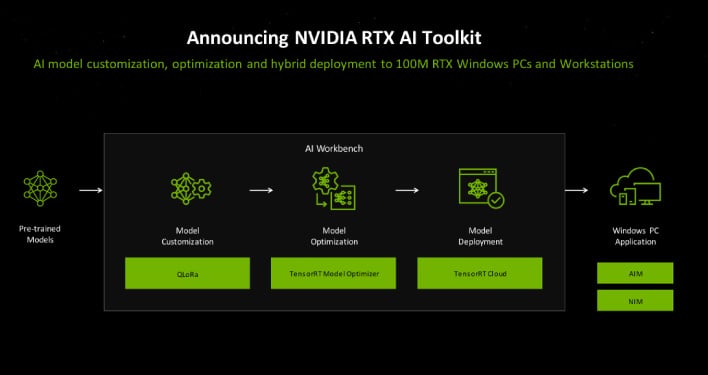NVIDIA Unveils RTX Copilot+ PCs And Kicks-Off Computex With AI Aplenty
GeForce RTX Equipped Copilot+ PCs
Microsoft recently kicked off its Copilot+ PC initiative during this year’s Microsoft Build conference a couple of weeks back. While the announcements of new Copilot+ PCs garnered a lot of attention, and highlighted the importance of a powerful NPU, all the initial Copilot+ PC announced lacked a discrete GPU. However, NVIDIA is showing off a new line of upcoming Copilot+ PCs at Computex that provide the added power of a discrete GPU, up to GeForce RTX 4070 GPUs.
The new lineup of RTX AI PCs include laptops from ASUS and MSI, such as the ASUS Tuf Gaming A14, and the MSI A16 AI Studio 2. NVIDIA added that along with up to a RTX 4070 GPU, the new AI laptops will house AMD's latest processors with an updated NPU.

It's important to note that Copilot+ requires an NPU. The AMD's upcoming NPU is powerful enough to anchieve Copilot+ certification, but the GeForces on-board can take care of other AI workloads where applicable.
NVIDIA RTX AI Toolkit
NVIDIA announced a heck of a lot more than some new hardwarer, however. The company also announced its new RTX AI Toolkit, a suite of apps and SDKs designed to aid developers in optimizing and deploying large generative AI models on Windows PCs.The NVIDIA RTX AI Toolkit comprises QLoRa, TensorRT Model Optimizer, and TensorRT Cloud. So, developers can customize a pre-trained model with open-source QLoRa tools, then use the TensorRT model optimizer to quantize models to consume less storage and RAM. The TensorRT Cloud then optimizes the model for peak performance across the RTX GPU lineups, resulting in up to 4x faster performance compared to the pre-trained generic model.
Project G-Assist
Also announced was Project G-Assist, a GeForce AI Assistant. NVIDIA noted that AI assistants will transform gaming and in-app experiences, from offering gaming strategies and analyzing multiplayer replays to assisting with complex creative workflows.Project G-Assist aims to “put game knowledge at players’ fingertips using generative AI.” The AI assistant will take voice or text inputs from a player, along with any contextual information from the game screen, and run the data through AI vision models. Project G-Assist will then generate a tailored response delivered as text or speech.
Along with helping players figure out a tough game, Project G-Assist will also be able to configure a player’s gaming system for optimal performance and efficiency. The AI assistant will provide insights into performance metrics, optimize graphic settings depending on hardware, apply a safe overclock, and finally reduce power consumption while maintaining peak performance.
“NVIDIA launched the era of AI PCs in 2018, with the release of RTX Tensor Core GPUs and DLSS technology,” remarked Jason Paul, vice president of consumer AI at NVIDIA. “Now, with Project G-Assist and NVIDIA ACE, we’re unlocking the next generation of AI-powered experiences for over 100 million RTX AI PC users.”
RTX AI Acceleration
NVIDIA also announced it is integrating RTX AI acceleration into apps for creators, modders, and video enthusiasts. Last year NVIDIA introduced RTX acceleration using TensorRT for Stable Diffusion user interfaces. Starting this week, RTX will also speed up the ComfyUI, delivering up to a 60% improvement in performance over the current version.NVIDIA is also making the RTX Remix Toolkit open source along wtih a new REST API, allowing modders to livelink RTX Remix to digital content creation tools such as Blender, and modding tools such as Hammer.
In addition to the items mentioned here, NVIDIA talked about a myriad of other things. including:
• ACE PC NIMs general availability, to accelerate the next wave of digital humans; new generative AI breakthroughs coming to ACE were also announced
• Windows Copilot Runtime with API access to RTX-accelerated SLMs and RAG
• New DLSS games, Star Wars Outlaws with DLSS 3.5 and Marvel Rivals with DLSS 3
• RTX Video SDK, with Davinci Resolve and Wondershare Filmora integrations
• Updated NVIDIA app beta, adding 120 FPS AV1 recording and one-click performance tuning
• PC Game Pass reward for GeForce gamers
• New G-SYNC Compatible displays
NVIDIA also annoucned a new program to make it easier to design and build small form factor PCs, powered by NVIDIA GPU. You can read about the GeForce SFF program here.





